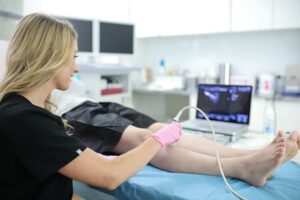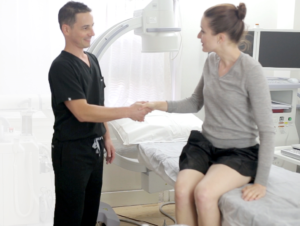What Kind of Specialist Treats Varicose Veins?
If you have spider veins or varicose veins, you must contact a vein specialist, i.e., a physician specializing in the diagnosis and treatment of vein problems. Vein specialists can come from all specialties of medicine, including anesthesiology, cardiology, and dermatology. The only requirement is that they must have advanced training in the diagnosis and treatment of spider veins, varicose veins, and other vein problems.
What is a Vein Specialist Called?
Phlebology is the branch of medicine dealing with veins and vascular health. As such, a vein specialist is officially called a phlebologist.
Can a Dermatologist get rid of Varicose Veins?
In some cases, yes, dermatologists provide treatments for spider veins and varicose veins. However, you should avoid dermatologists without specialized training in minimally invasive spider vein and varicose vein treatments. That’s because dermatologists (and medical spas) often focus on cosmetic relief. They might use sclerotherapy or laser therapy to remove spider veins from your skin’s surface, but they don’t treat the underlying problems.
Sclerotherapy is widely considered the best spider vein treatment, but it should only be performed after conducting a thorough ultrasound diagnostic test. That’s because spider veins are often symptomatic of chronic venous insufficiency, a medical condition wherein your vein valves collapse and blood accumulates in the leg veins. Dermatologists specialize in skin-related concerns, so they can improve the external appearance of your skin by removing spider veins, but they don’t always treat vein disease.
Treating spider veins without addressing the underlying chronic venous insufficiency is like painting a stained wall instead of fixing the leaky pipes underneath. The spider veins will inevitably return later. However, you can consult your dermatologist if they also have specialized training in the diagnosis and treatment of vein disease. You can also ask them about their treatment protocols to determine if they diagnose chronic venous insufficiency.
What are the Qualities of the Best Vein Doctors?
The most important quality for all vein doctors is specialized training in the diagnosis and treatment of chronic venous insufficiency. You must find vein doctors who use the latest vascular imaging tests to determine if you have vein disease before curating a treatment plan. Furthermore, they should only recommend minimally invasive spider vein and varicose vein treatments instead of surgeries. That’s because vascular surgery is now considered obsolete and outdated — it increases the risk of complications and involves downtime.
Our spider vein and varicose vein treatment centers in California are led by some of the best vein doctors in the country. Our vein doctors specialize in the latest minimally invasive procedures, and they stay abreast of the latest developments in vein care. Furthermore, they are board-certified vein doctors with special recognition from the American Board of Venous and Lymphatic Medicine, an organization that certifies the country’s top 1% vein doctors. Our board-certified vascular surgeons have also completed strict residency programs and fellowships.
Do you Have to be Referred to a Vein Specialist?
No. You don’t have to be referred to a vein specialist. You can contact our vein doctors in California if you have any of the signs or symptoms of vein disease. Chronic venous insufficiency is a medical condition wherein your vein valves — usually responsible for effective blood circulation to the heart — collapse. This makes your blood flow backward and accumulates in your leg veins, leading to numerous vein problems.

Chronic venous insufficiency is one of the most underdiagnosed conditions because its early signs and symptoms are easily misattributed to aging or exhaustion. You should consult a vein specialist in California if you have leg heaviness, restless leg syndrome, leg swelling, frequent leg cramps, leg pain, spider veins, or varicose veins. These are the most common signs and symptoms of vein disease.
What can I Expect at a Vascular Doctor?
When you consult a vein and vascular doctor in California, you can expect a thorough consultation and diagnosis. The vein doctor will examine your leg veins and review your medical history. They will determine if you have a history of vein problems and ask about your family history — genetic predisposition is the leading risk factor for vein disease. They will also ask about your symptoms — led heaviness, restless leg syndrome, leg cramps, and leg swelling are common symptoms of chronic venous insufficiency.
What can I Expect From a Vascular Ultrasound?
After the diagnosis and consultation, the vein doctor will perform a vascular ultrasound test, known as duplex ultrasound. This test involves using ultrasound energy to visualize the blood flow in your leg veins. The direction of blood flow will reveal if you have chronic venous insufficiency, allowing the vein doctor to curate the ideal vein treatment plan.
What are my Varicose Vein Treatment Options?
- Radiofrequency ablation is a minimally invasive procedure wherein thermal energy is used to collapse the diseased vein responsible for your vein problems.
- Endovenous laser ablation is a minimally invasive procedure wherein laser energy is used to destroy the diseased vein responsible for your vein problems.
- VenaSeal is a minimally invasive procedure wherein medical-grade adhesives are used to seal the diseased veins’ walls shut, rerouting the accumulated blood into healthier leg veins.
- ClariVein is a minimally invasive procedure wherein a specialized catheter with a rotating tip damages the diseased vein’s walls while injecting a sclerosant medicine.
- Ambulatory phlebectomy is a minimally invasive procedure wherein the vein doctor physically extracts the superficial varicose veins through small incisions on the skin’s surface.
- Sclerotherapy is a minimally invasive procedure wherein a sclerosant solution is injected into spider veins, turning them into hardened scar tissues eventually absorbed by the body.
What Happens After Varicose Vein Treatments?
Minimally invasive spider vein and varicose vein treatments conclude within 60 minutes with no downtime. You’ll have to wear bandages and compression stockings for a few days, but you can resume your daily activities and work immediately. You may experience mild post-treatment discomfort, but that can be managed with over-the-counter medications.